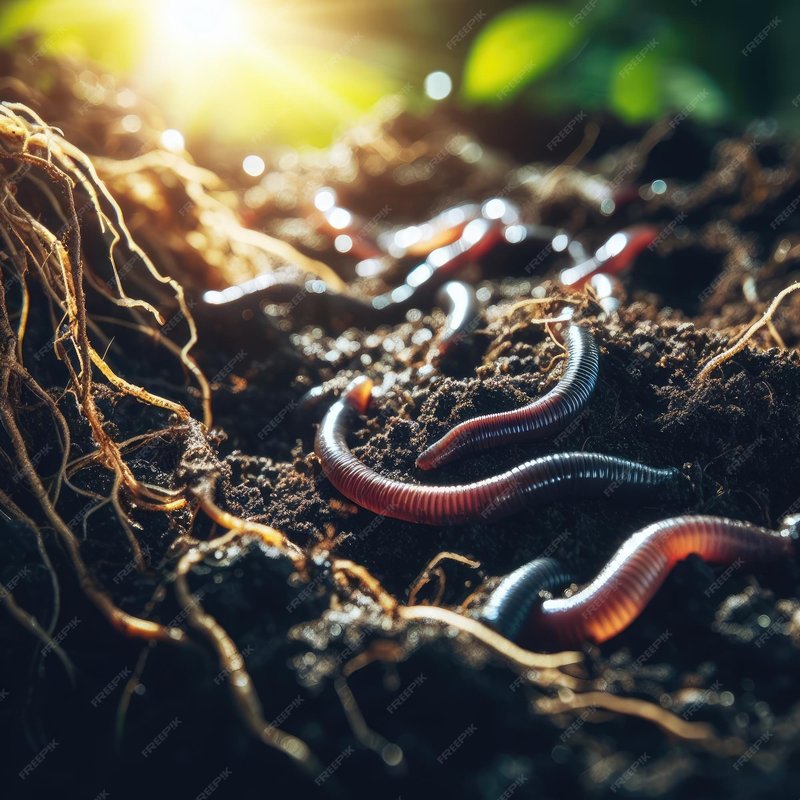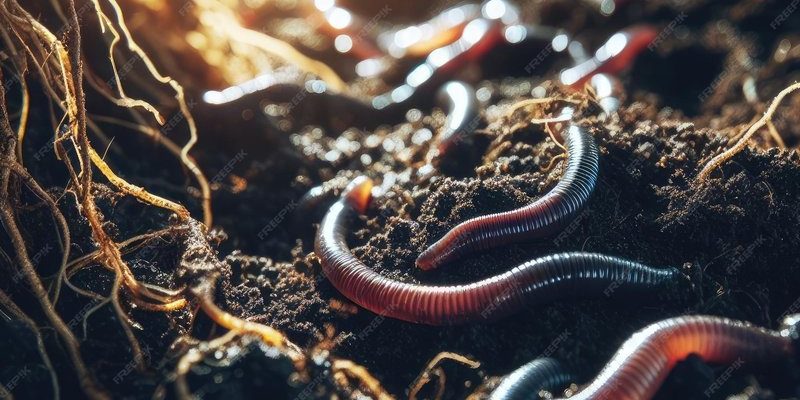
You might be wondering why we should care about soil microbial life. Well, think of it this way: just like we need a balanced diet to stay healthy, plants and ecosystems need a lively microbial community in the soil to thrive. Earthworms are like the unsung heroes of this hidden world, creating habitats and enriching the soil for these microorganisms. So, let’s dig deeper into this topic and uncover the fascinating relationship between earthworms and soil microbes.
What Do Earthworms Do for the Soil?
Earthworms are often referred to as **nature’s plow**. They tunnel through the soil, which improves aeration and drainage. When they move, they not only mix the soil but also break down organic matter, like leaves and plant debris. This process creates a nutrient-rich environment that benefits both plants and microorganisms.
This mixing action helps distribute nutrients evenly in the soil. As earthworms consume organic matter, they excrete it in a nutrient-rich form called **castings**. These castings are incredibly beneficial for microbial life, providing a feast of nutrients that help bacteria and fungi thrive.
By improving soil structure and nutrient availability, earthworms indirectly support plant growth. Healthy plants, in turn, have a robust ability to support other life forms, creating a thriving ecosystem. So, their role goes beyond just working the soil; it’s about creating a balanced and productive environment for life.
The Connection Between Earthworms and Soil Microbes
When we talk about **soil microbial life**, we’re referring to a whole universe of tiny organisms, including bacteria, fungi, and protozoa. These microbes break down organic material and play a crucial role in nutrient cycling. Earthworms help create a hospitable environment for these microbes by enhancing soil structure and moisture retention.
Earthworms also *feed on microbes*, which helps regulate their populations. This relationship is quite symbiotic. As earthworms digest organic matter, they release nutrients that microbes need to thrive. In turn, these microbes can help break down even more organic matter. It’s a beautiful cycle of give and take.
You might think of it like a neighborhood potluck, where everyone brings something to the table. Earthworms bring their organic matter and nutrients, while microbes contribute their ability to break it down and make it accessible for plants. Together, they create a harmonious ecosystem that supports plant health and productivity.
How Earthworms Enhance Soil Fertility
Soil fertility is essential for agriculture, gardening, and overall ecosystem health. Earthworms play a crucial role in maintaining this fertility. They break down organic matter, such as dead plants and animal materials, into simpler compounds that are easier for plants to absorb.
Let’s look at their castings again. These little nuggets are packed with essential nutrients like nitrogen, phosphorus, and potassium. When they’re spread throughout the soil, they significantly boost its nutrient profile. This means healthier plants, which can produce more fruits, vegetables, and flowers.
Moreover, earthworm activity can even improve soil pH, making it less acidic and more suitable for a wider range of plants. By altering the soil structure, earthworms help create an environment where plants can access water and nutrients more efficiently. So, they don’t just enrich the soil; they also enhance its conditions for optimal plant growth.
Earthworms and Soil Microbial Diversity
Diversity is essential in any ecosystem, including soil. Earthworms contribute to this diversity by creating a variety of habitats for different microorganisms. Their burrowing activities create channels in the soil, allowing air and water to permeate deeper layers.
These channels provide different niches within the soil, allowing for various types of microbes to thrive. Some prefer aerobic (oxygen-rich) conditions, while others favor anaerobic (oxygen-poor) environments. By facilitating this variety, earthworms help promote a more resilient and balanced soil ecosystem.
Additionally, the presence of earthworms can increase the abundance of beneficial microbes. For example, studies have shown that soils with a healthy earthworm population often have higher levels of specific bacteria that promote plant growth. This means that earthworms not only help maintain microbial diversity but can enhance the presence of microbes that directly benefit plants.
Challenges Facing Earthworm Populations
While earthworms have a positive impact on soil health, they face several challenges. Urbanization, pollution, and climate change all threaten their populations. Soil degradation, often caused by intensive farming practices, can lead to a decline in earthworm numbers.
When soil is heavily disturbed, or when chemical fertilizers and pesticides are used, it can disrupt the delicate balance of soil life. This puts stress on earthworms and ultimately affects their ability to enhance soil microbial life.
The loss of earthworms can create a domino effect, leading to reduced soil health, poorer plant growth, and ultimately, a less resilient ecosystem. So, protecting earthworm populations is not just about preserving these creatures; it’s about safeguarding the health of our soil and the broader environment.
How Can We Support Earthworm Populations?
If you care about soil health and want to support earthworms, there are several simple steps you can take. First, consider using organic gardening practices. This means avoiding chemical fertilizers and pesticides, which can harm earthworms and other beneficial soil life.
Another effective way to support earthworms is to add organic matter to your garden, like compost or mulch. This not only provides food for earthworms but also helps to improve soil structure and fertility.
You might also want to practice minimal tillage. Tilling can disturb earthworm habitats and reduce their populations. By minimizing soil disturbance, you can help maintain a thriving ecosystem where earthworms can flourish.
The Bigger Picture: Earthworms and Sustainable Agriculture
In the grand scheme of things, earthworms play a vital role in sustainable agriculture. Their presence can lead to healthier soils, which in turn supports healthy crops. For farmers, this means better yields and less reliance on chemical fertilizers.
More and more farmers are recognizing the importance of earthworms in their agricultural practices. By creating environments that support earthworm populations, they can improve soil resilience and productivity in the long run.
This shift toward sustainable practices benefits not just farmers but also the environment. Healthier soils mean better water retention, reduced erosion, and enhanced carbon sequestration. So, when we think about earthworms, we’re really thinking about solutions for a healthier planet.
In conclusion, the impact of earthworms on soil microbial life is profound and multifaceted. They enrich the soil, promote a healthy microbial community, and contribute to overall ecosystem health. Protecting and supporting these little creatures is crucial for maintaining the balance and fertility of our soils. So next time you spot an earthworm in your garden, take a moment to appreciate the vital role they play in the world beneath our feet.

